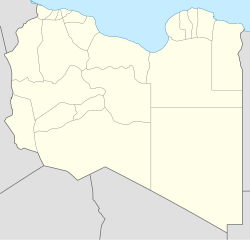Ma'tan as-Sarra
Ma'tan as-Sarra
معطن السارة | |
|---|---|
| Coordinates: 21°41′0″N 21°49′52″E / 21.68333°N 21.83111°E | |
| Country | Libya |
Ma'tan as-Sarra is an oasis in the Kufra District municipality in the southeast corner of Libya. It is located in the Libyan Desert, 322 kilometres (200 mi) southwest of Kufra. A marginal oasis, with few palms and substandard water, it allowed the creation in 1811 of the last trans-Saharan caravan route. However, it historically has been little visited by Toubou and Zaghawa nomads.[1]
In 1934, Ma'tan as-Sarra was turned over as part of the Sarra Triangle to Fascist Italy by the Anglo-Egyptian Sudan, who considered the area worthless sand and a cheap appeasement to Benito Mussolini's attempts at an empire.[1]
In 1972, Libyan leader Muammar Gaddafi felt that Jaafar Nimeiry of Sudan had betrayed the Arab cause by signing the 1972 Addis Ababa Agreement ending the first Sudanese civil war.[1] He established a base at Ma'tan as-Sarra to stockpile weapons and as a staging area for Sudanese insurgents, who were trained at the bases in Joudaim and Ma'sar Ra's near Tripoli.[2] In July 1976, one thousand followers of Sudanese opposition leader Sadiq al-Mahdi left the oasis and stormed Khartoum after crossing northern Darfur and Kordofan. Al-Mahdi's force was defeated only after a tank battalion struck into the city after three days of heavy fighting.[1]
Libya also established Maaten al-Sarra Air Base, which was heavily used during the Chadian-Libyan conflict (1978–1987). The base was subject to a highly successful raid on September 5, 1987 by the Chadian army that contributed to the signing of the September 11 Chad-Libya ceasefire that brought an end to the war.
References
[edit]

